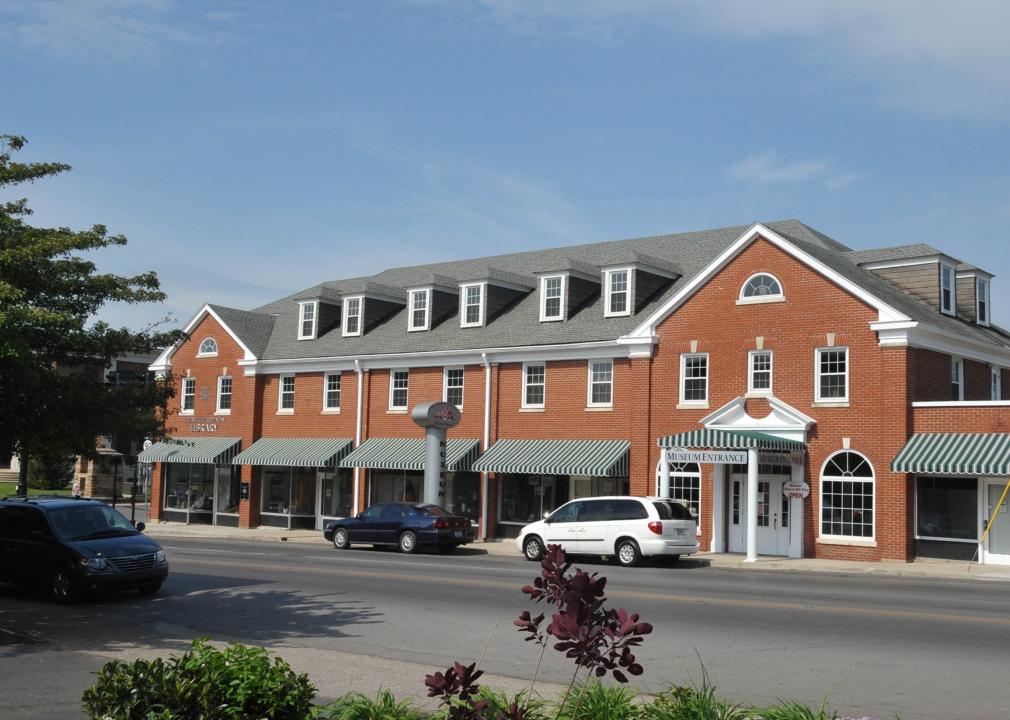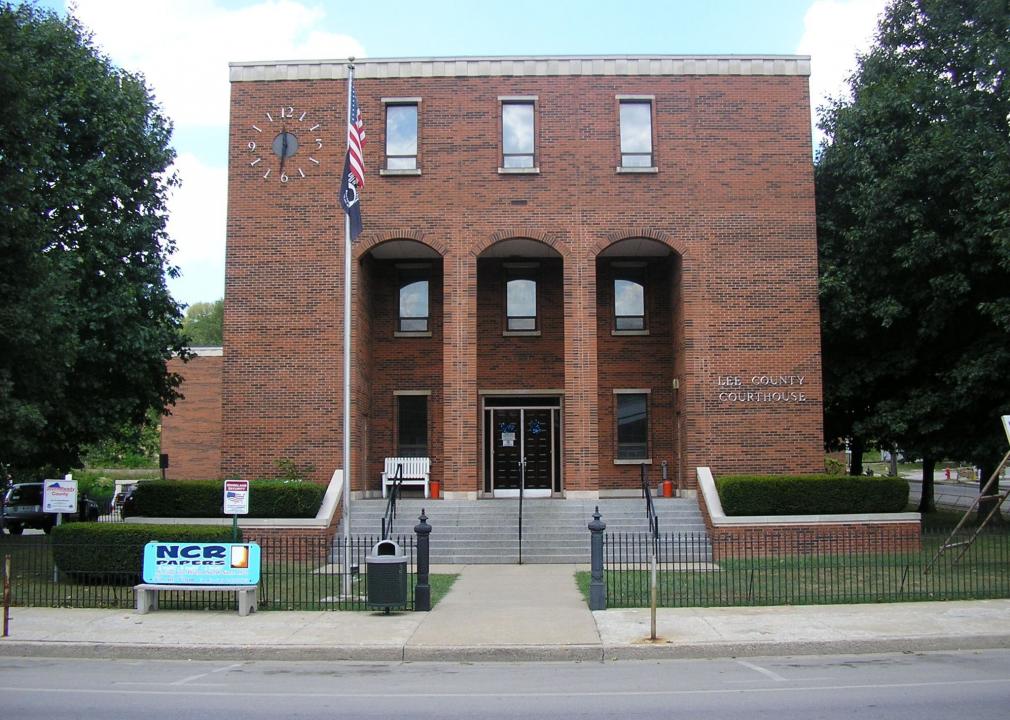Counties with the highest rate of food insecurity in Kentucky
Published 3:30 pm Saturday, February 5, 2022
W.marsh // Wikimedia Commons
Counties with the highest rate of food insecurity in Kentucky
Every county in the United States is home to people experiencing food insecurity, defined by the nonprofit Feeding America as “a lack of consistent access to enough food for every person in a household to live an active, healthy life.”
The USDA estimates that 89.5% of U.S. households were food secure throughout 2019—that’s 116.0 million people. The COVID-19 pandemic put further strain on households already experiencing food hardship, with Feeding America estimating that 42 million people, or 1 in 8 Americans, may experience food insecurity in 2021. This is a slight improvement from 2020 numbers but still represents an enormous burden for millions of children and adults.
Stacker compiled a list of counties in Kentucky with the highest rate of food insecurity using data from Feeding America. Counties are ranked by highest percent of population with food insecurity as of 2019.
![]()
JERRYE & ROY KLOTZ MD // Wikimedia Commons
#50. Hart County
– Food insecurity rate: 16.6% (3,110 total)
— 52.3% higher than national average
– Child food insecurity rate: 19.7% (920 total)
— 34.9% higher than national average
– Annual food budget shortfall: $1,453,000
— Cost per meal: $2.73
W.marsh // Wikimedia Commons
#49. Adair County
– Food insecurity rate: 16.7% (3,210 total)
— 53.2% higher than national average
– Child food insecurity rate: 21.1% (790 total)
— 44.5% higher than national average
– Annual food budget shortfall: $1,527,000
— Cost per meal: $2.78
verygreen // Wikimedia Commons
#48. Rockcastle County
– Food insecurity rate: 16.8% (2,820 total)
— 54.1% higher than national average
– Child food insecurity rate: 20.7% (770 total)
— 41.8% higher than national average
– Annual food budget shortfall: $1,312,000
— Cost per meal: $2.72
Nyttend // Wikimedia Commons
#47. Pulaski County
– Food insecurity rate: 16.9% (10,890 total)
— 55.0% higher than national average
– Child food insecurity rate: 19.9% (2,850 total)
— 36.3% higher than national average
– Annual food budget shortfall: $4,996,000
— Cost per meal: $2.68
Nyttend // Wikimedia Commons
#46. Green County
– Food insecurity rate: 17.0% (1,860 total)
— 56.0% higher than national average
– Child food insecurity rate: 20.3% (470 total)
— 39.0% higher than national average
– Annual food budget shortfall: $892,000
— Cost per meal: $2.80
w:User:Malepheasant // Wikimedia Commons
#45. Boyd County
– Food insecurity rate: 17.0% (8,130 total)
— 56.0% higher than national average
– Child food insecurity rate: 22.5% (2,280 total)
— 54.1% higher than national average
– Annual food budget shortfall: $3,828,000
— Cost per meal: $2.75
FloNight (Sydney Poore) and Russell Poore // Wikimedia Commons
#44. Fleming County
– Food insecurity rate: 17.1% (2,480 total)
— 56.9% higher than national average
– Child food insecurity rate: 23.1% (820 total)
— 58.2% higher than national average
– Annual food budget shortfall: $1,208,000
— Cost per meal: $2.85
W.marsh // Wikimedia Commons
#43. Laurel County
– Food insecurity rate: 17.2% (10,350 total)
— 57.8% higher than national average
– Child food insecurity rate: 21.5% (3,000 total)
— 47.3% higher than national average
– Annual food budget shortfall: $4,703,000
— Cost per meal: $2.66
Bedford // Wikimedia Commons
#42. Webster County
– Food insecurity rate: 17.4% (2,280 total)
— 59.6% higher than national average
– Child food insecurity rate: 22.0% (670 total)
— 50.7% higher than national average
– Annual food budget shortfall: $1,066,000
— Cost per meal: $2.74
Brian Stansberry // Wikimedia Commons
#41. Monroe County
– Food insecurity rate: 17.5% (1,860 total)
— 60.6% higher than national average
– Child food insecurity rate: 22.0% (530 total)
— 50.7% higher than national average
– Annual food budget shortfall: $866,000
— Cost per meal: $2.72
Nyttend // Wikimedia Commons
#40. Russell County
– Food insecurity rate: 17.5% (3,110 total)
— 60.6% higher than national average
– Child food insecurity rate: 20.7% (830 total)
— 41.8% higher than national average
– Annual food budget shortfall: $1,449,000
— Cost per meal: $2.73
Nyttend // Wikimedia Commons
#39. Metcalfe County
– Food insecurity rate: 17.6% (1,770 total)
— 61.5% higher than national average
– Child food insecurity rate: 23.0% (530 total)
— 57.5% higher than national average
– Annual food budget shortfall: $824,000
— Cost per meal: $2.72
Nyttend // Wikimedia Commons
#38. Barren County
– Food insecurity rate: 17.6% (7,740 total)
— 61.5% higher than national average
– Child food insecurity rate: 23.2% (2,430 total)
— 58.9% higher than national average
– Annual food budget shortfall: $3,511,000
— Cost per meal: $2.65
Nyttend // Wikimedia Commons
#37. Casey County
– Food insecurity rate: 17.7% (2,810 total)
— 62.4% higher than national average
– Child food insecurity rate: 21.7% (780 total)
— 48.6% higher than national average
– Annual food budget shortfall: $1,306,000
— Cost per meal: $2.72
W.marsh // Wikimedia Commons
#36. Robertson County
– Food insecurity rate: 17.8% (380 total)
— 63.3% higher than national average
– Child food insecurity rate: 26.7% (140 total)
— 82.9% higher than national average
– Annual food budget shortfall: $182,000
— Cost per meal: $2.80
Huw Williams (Huwmanbeing) // Wikimedia Commons
#35. Grayson County
– Food insecurity rate: 18.0% (4,710 total)
— 65.1% higher than national average
– Child food insecurity rate: 24.0% (1,500 total)
— 64.4% higher than national average
– Annual food budget shortfall: $2,053,000
— Cost per meal: $2.55
Nyttend // Wikimedia Commons
#34. Powell County
– Food insecurity rate: 18.1% (2,230 total)
— 66.1% higher than national average
– Child food insecurity rate: 21.8% (650 total)
— 49.3% higher than national average
– Annual food budget shortfall: $1,114,000
— Cost per meal: $2.92
W.marsh // Wikimedia Commons
#33. Bath County
– Food insecurity rate: 18.1% (2,230 total)
— 66.1% higher than national average
– Child food insecurity rate: 22.8% (730 total)
— 56.2% higher than national average
– Annual food budget shortfall: $1,105,000
— Cost per meal: $2.90
Nyttend // Wikimedia Commons
#32. Morgan County
– Food insecurity rate: 18.3% (2,430 total)
— 67.9% higher than national average
– Child food insecurity rate: 23.6% (580 total)
— 61.6% higher than national average
– Annual food budget shortfall: $1,180,000
— Cost per meal: $2.84
Nyttend // Wikimedia Commons
#31. Clinton County
– Food insecurity rate: 18.4% (1,880 total)
— 68.8% higher than national average
– Child food insecurity rate: 23.2% (540 total)
— 58.9% higher than national average
– Annual food budget shortfall: $899,000
— Cost per meal: $2.80
JERRYE & ROY KLOTZ MD // Wikimedia Commons
#30. Wayne County
– Food insecurity rate: 18.5% (3,790 total)
— 69.7% higher than national average
– Child food insecurity rate: 25.2% (1,090 total)
— 72.6% higher than national average
– Annual food budget shortfall: $1,757,000
— Cost per meal: $2.71
No machine-readable author provided. Blinutne assumed (based on copyright claims). // Wikimedia Commons
#29. Whitley County
– Food insecurity rate: 18.5% (6,680 total)
— 69.7% higher than national average
– Child food insecurity rate: 22.1% (2,000 total)
— 51.4% higher than national average
– Annual food budget shortfall: $3,195,000
— Cost per meal: $2.80
Nyttend // Wikimedia Commons
#28. Menifee County
– Food insecurity rate: 18.7% (1,200 total)
— 71.6% higher than national average
– Child food insecurity rate: 27.1% (370 total)
— 85.6% higher than national average
– Annual food budget shortfall: $588,000
— Cost per meal: $2.87
W.marsh // Wikimedia Commons
#27. Rowan County
– Food insecurity rate: 18.8% (4,600 total)
— 72.5% higher than national average
– Child food insecurity rate: 23.5% (1,090 total)
— 61.0% higher than national average
– Annual food budget shortfall: $2,252,000
— Cost per meal: $2.86
Nyttend // Wikimedia Commons
#26. Martin County
– Food insecurity rate: 19.2% (2,230 total)
— 76.1% higher than national average
– Child food insecurity rate: 22.0% (510 total)
— 50.7% higher than national average
– Annual food budget shortfall: $1,084,000
— Cost per meal: $2.84
Calvin Beale // Wikimedia Commons
#25. Fulton County
– Food insecurity rate: 19.4% (1,190 total)
— 78.0% higher than national average
– Child food insecurity rate: 29.6% (400 total)
— 102.7% higher than national average
– Annual food budget shortfall: $555,000
— Cost per meal: $2.73
CoryClaxon // Wikimedia Commons
#24. Carter County
– Food insecurity rate: 19.6% (5,310 total)
— 79.8% higher than national average
– Child food insecurity rate: 25.5% (1,540 total)
— 74.7% higher than national average
– Annual food budget shortfall: $2,945,000
— Cost per meal: $3.24
HiB2Bornot2B // Wikimedia Commons
#23. Johnson County
– Food insecurity rate: 19.7% (4,460 total)
— 80.7% higher than national average
– Child food insecurity rate: 23.0% (1,170 total)
— 57.5% higher than national average
– Annual food budget shortfall: $2,159,000
— Cost per meal: $2.83
Nyttend // Wikimedia Commons
#22. Pike County
– Food insecurity rate: 19.7% (11,740 total)
— 80.7% higher than national average
– Child food insecurity rate: 26.2% (3,220 total)
— 79.5% higher than national average
– Annual food budget shortfall: $5,827,000
— Cost per meal: $2.90
Nyttend // Wikimedia Commons
#21. Nicholas County
– Food insecurity rate: 19.9% (1,420 total)
— 82.6% higher than national average
– Child food insecurity rate: 28.0% (480 total)
— 91.8% higher than national average
– Annual food budget shortfall: $695,000
— Cost per meal: $2.86
Nyttend // Wikimedia Commons
#20. Lawrence County
– Food insecurity rate: 20.2% (3,160 total)
— 85.3% higher than national average
– Child food insecurity rate: 25.6% (960 total)
— 75.3% higher than national average
– Annual food budget shortfall: $1,524,000
— Cost per meal: $2.82
C. Bedford Crenshaw // Wikimedia Commons
#19. Lewis County
– Food insecurity rate: 20.3% (2,720 total)
— 86.2% higher than national average
– Child food insecurity rate: 25.8% (770 total)
— 76.7% higher than national average
– Annual food budget shortfall: $1,303,000
— Cost per meal: $2.80
Nyttend // Wikimedia Commons
#18. Perry County
– Food insecurity rate: 20.8% (5,540 total)
— 90.8% higher than national average
– Child food insecurity rate: 26.2% (1,560 total)
— 79.5% higher than national average
– Annual food budget shortfall: $2,778,000
— Cost per meal: $2.93
Nyttend // Wikimedia Commons
#17. Knox County
– Food insecurity rate: 20.9% (6,540 total)
— 91.7% higher than national average
– Child food insecurity rate: 26.0% (1,910 total)
— 78.1% higher than national average
– Annual food budget shortfall: $3,098,000
— Cost per meal: $2.77
Nyttend // Wikimedia Commons
#16. Estill County
– Food insecurity rate: 21.5% (3,070 total)
— 97.2% higher than national average
– Child food insecurity rate: 27.8% (850 total)
— 90.4% higher than national average
– Annual food budget shortfall: $1,503,000
— Cost per meal: $2.86
Kybluegrass // Wikimedia Commons
#15. McCreary County
– Food insecurity rate: 21.8% (3,810 total)
— 100.0% higher than national average
– Child food insecurity rate: 27.9% (1,100 total)
— 91.1% higher than national average
– Annual food budget shortfall: $1,779,000
— Cost per meal: $2.73
Nyttend // Wikimedia Commons
#14. Elliott County
– Food insecurity rate: 22.4% (1,680 total)
— 105.5% higher than national average
– Child food insecurity rate: 28.9% (400 total)
— 97.9% higher than national average
– Annual food budget shortfall: $815,000
— Cost per meal: $2.84
Nyttend // Wikimedia Commons
#13. Floyd County
– Food insecurity rate: 22.4% (8,160 total)
— 105.5% higher than national average
– Child food insecurity rate: 29.0% (2,280 total)
— 98.6% higher than national average
– Annual food budget shortfall: $4,300,000
— Cost per meal: $3.08
W.marsh // Wikimedia Commons
#12. Jackson County
– Food insecurity rate: 22.7% (3,030 total)
— 108.3% higher than national average
– Child food insecurity rate: 28.9% (870 total)
— 97.9% higher than national average
– Annual food budget shortfall: $1,429,000
— Cost per meal: $2.76
Nyttend // Wikimedia Commons
#11. Knott County
– Food insecurity rate: 23.1% (3,530 total)
— 111.9% higher than national average
– Child food insecurity rate: 31.7% (970 total)
— 117.1% higher than national average
– Annual food budget shortfall: $1,756,000
— Cost per meal: $2.91
JERRYE & ROY KLOTZ MD // Wikimedia Commons
#10. Owsley County
– Food insecurity rate: 23.4% (1,040 total)
— 114.7% higher than national average
– Child food insecurity rate: 28.6% (260 total)
— 95.9% higher than national average
– Annual food budget shortfall: $515,000
— Cost per meal: $2.89
W.marsh // Wikimedia Commons
#9. Lee County
– Food insecurity rate: 23.8% (1,640 total)
— 118.3% higher than national average
– Child food insecurity rate: 30.5% (430 total)
— 108.9% higher than national average
– Annual food budget shortfall: $811,000
— Cost per meal: $2.89
Nyttend // Wikimedia Commons
#8. Letcher County
– Food insecurity rate: 24.0% (5,360 total)
— 120.2% higher than national average
– Child food insecurity rate: 32.2% (1,550 total)
— 120.5% higher than national average
– Annual food budget shortfall: $2,624,000
— Cost per meal: $2.86
Nyttend // Wikimedia Commons
#7. Clay County
– Food insecurity rate: 24.7% (5,030 total)
— 126.6% higher than national average
– Child food insecurity rate: 31.8% (1,380 total)
— 117.8% higher than national average
– Annual food budget shortfall: $2,248,000
— Cost per meal: $2.61
Nyttend // Wikimedia Commons
#6. Wolfe County
– Food insecurity rate: 24.8% (1,790 total)
— 127.5% higher than national average
– Child food insecurity rate: 29.6% (490 total)
— 102.7% higher than national average
– Annual food budget shortfall: $887,000
— Cost per meal: $2.90
Nyttend // Wikimedia Commons
#5. Magoffin County
– Food insecurity rate: 24.8% (3,090 total)
— 127.5% higher than national average
– Child food insecurity rate: 32.8% (940 total)
— 124.7% higher than national average
– Annual food budget shortfall: $1,529,000
— Cost per meal: $2.89
Nyttend // Wikimedia Commons
#4. Bell County
– Food insecurity rate: 24.8% (6,650 total)
— 127.5% higher than national average
– Child food insecurity rate: 31.7% (1,810 total)
— 117.1% higher than national average
– Annual food budget shortfall: $3,271,000
— Cost per meal: $2.88
Nyttend // Wikimedia Commons
#3. Breathitt County
– Food insecurity rate: 25.3% (3,280 total)
— 132.1% higher than national average
– Child food insecurity rate: 32.7% (860 total)
— 124.0% higher than national average
– Annual food budget shortfall: $1,631,000
— Cost per meal: $2.91
Nyttend // Wikimedia Commons
#2. Leslie County
– Food insecurity rate: 25.9% (2,660 total)
— 137.6% higher than national average
– Child food insecurity rate: 33.2% (730 total)
— 127.4% higher than national average
– Annual food budget shortfall: $1,293,000
— Cost per meal: $2.84
W.marsh // Wikimedia Commons
#1. Harlan County
– Food insecurity rate: 26.6% (7,100 total)
— 144.0% higher than national average
– Child food insecurity rate: 35.1% (2,150 total)
— 140.4% higher than national average
– Annual food budget shortfall: $3,407,000
— Cost per meal: $2.81
























































